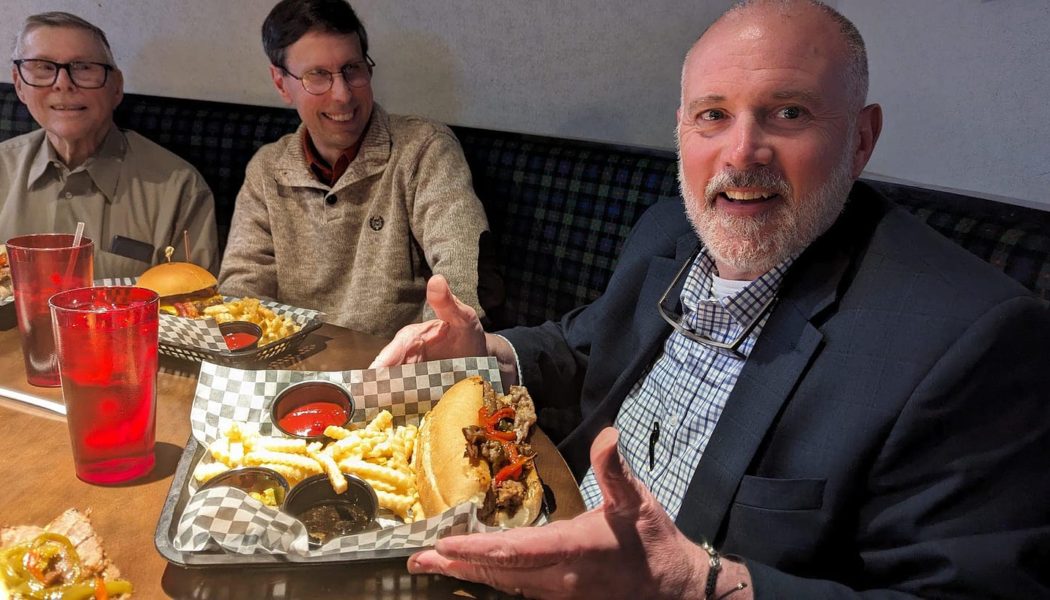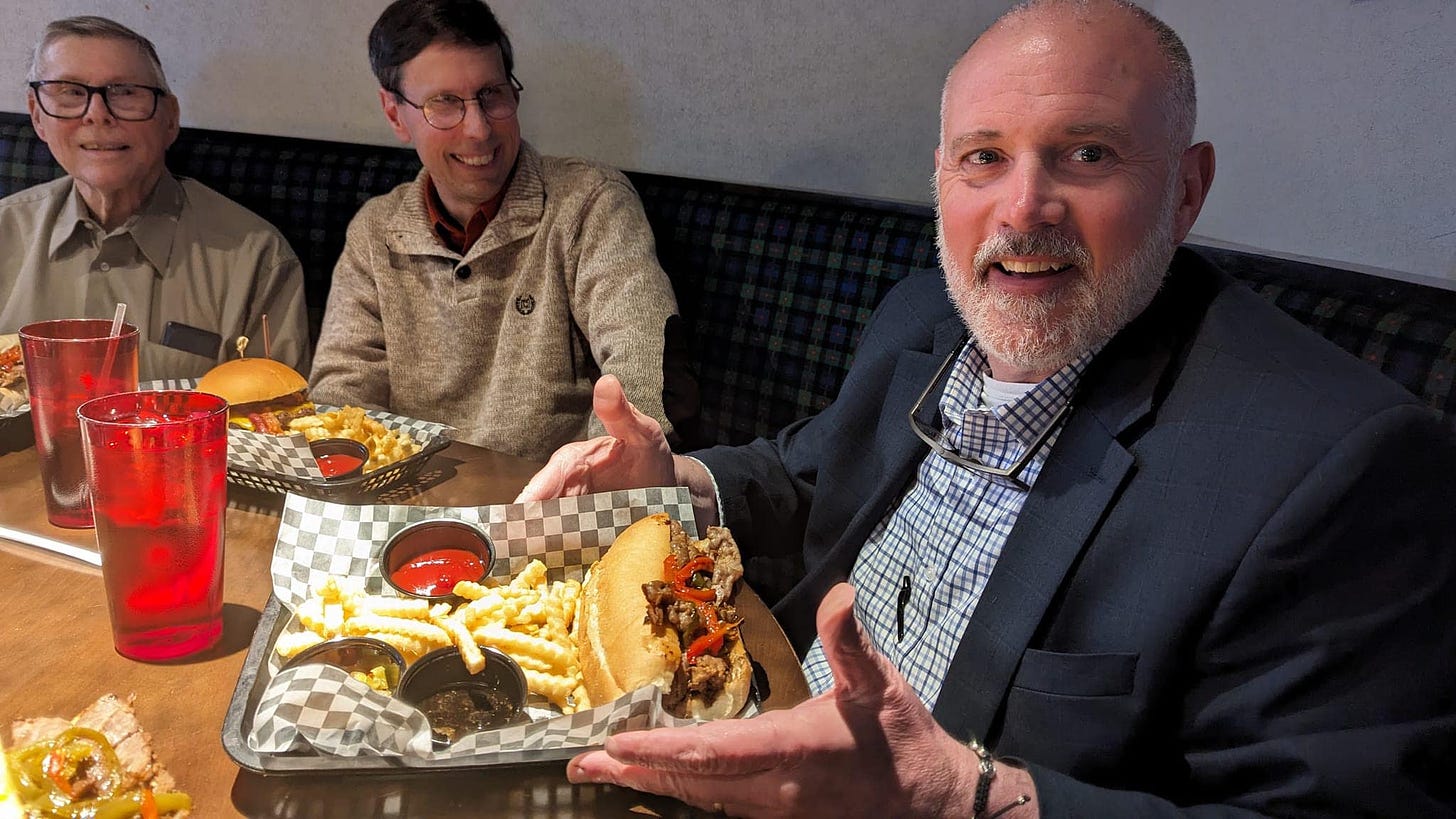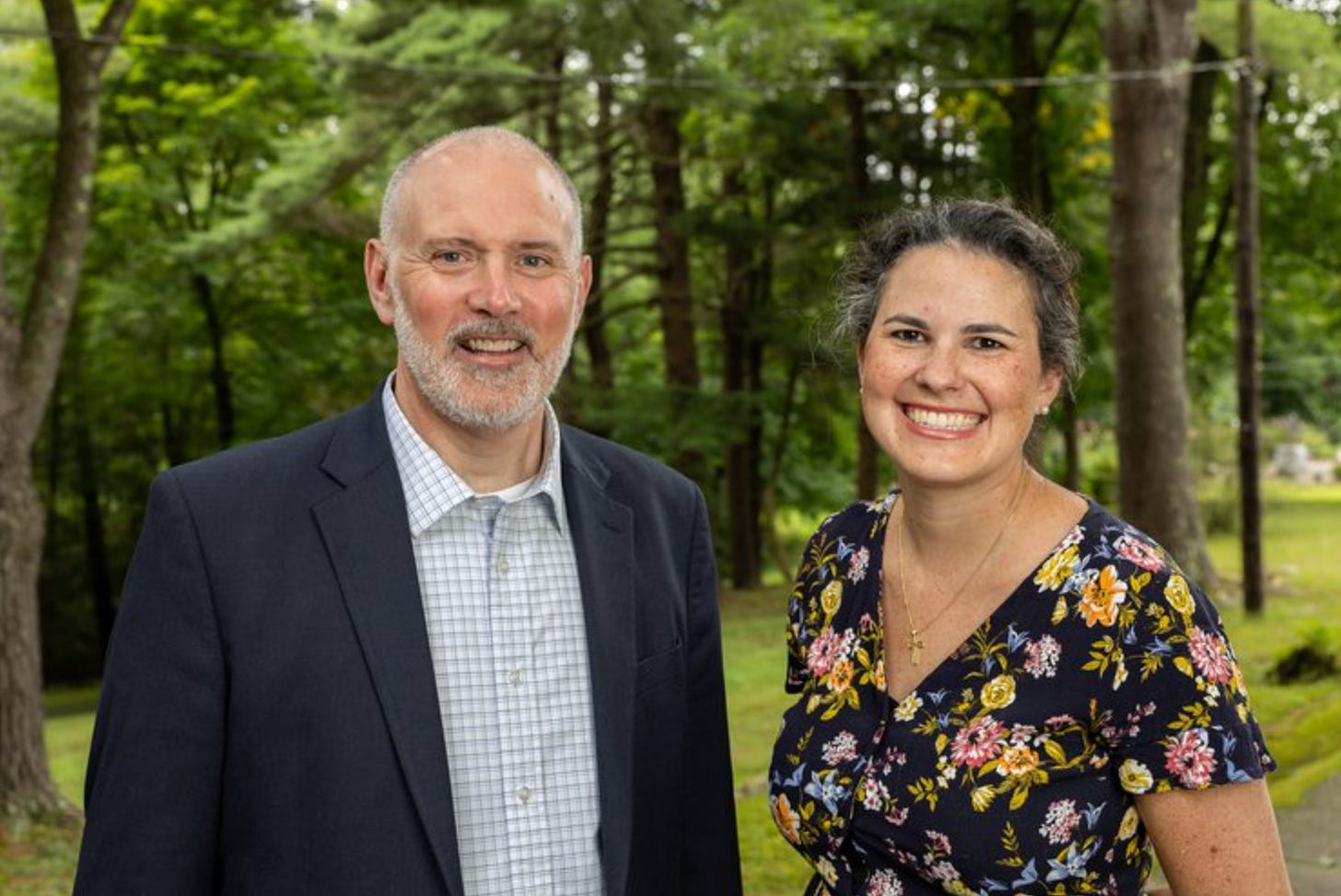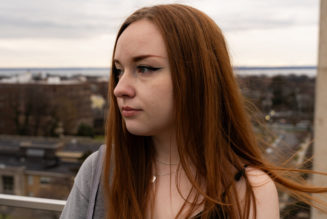Listen to this interview here: The Pillar TL;DR
As Republicans and Democrats compete in a fractious American election cycle, a small third-party is trying to woo Catholic voters, with a political vision it says is drawn from the principles of Catholic social teaching.
Peter Sonski, 61, is a Connecticut grandfather, a former local public school board member, and the presidential nominee for the American Solidarity Party, which says it promotes human life, social justice, environmental conservation, and international peace.
With a growing number of Catholics feeling disenfranchised from major political parties, the American Solidarity Party has in recent elections attracted interest among some Catholic voters. Sonski talked with The Pillar about his vision, his campaign, and his party’s future.
This interview has been edited for length and clarity.
You are the presidential nominee for a third party which has gained some popularity among Catholics in recent years, the American Solidarity Party.
What is the American Solidarity Party? What does it stand for?
The American Solidarity Party is the U.S. or American manifestation of a political movement known as Christian Democracy.
Christian Democracy has had success in other places in the world, predominantly in Europe, but also some places in Latin America. It’s based heavily on Catholic social teaching.
Christian Democracy has not existed in any fashion here in the United States, until a number of people decided that they were going to introduce it — back in about 2011 that they came together and decided to begin this political movement. They first called it the Christian Democratic Party USA, and later changed it to the American Solidarity Party.
The party has had presidential nominees in 2016, 2020, and now in 2024.
When you say that Christian Democracy draws from Catholic social teaching, what does that mean to you in a broad sense?
I ask, because I think there are both Republicans and Democrats who would say that their own political parties draw from elements of Catholic social teaching.
So what are the tenets of Catholic social teaching which shape the American Solidarity Party?
Well, I think that setup is perfect. There are elements [of Catholic social teaching] to be found in both the Republican Party’s platform, as well as in the Democratic Party’s platform.
The distinction with the American Solidarity Party is that those elements are united.
For example, there are socially conservative positions which the Republican Party has historically held that are in keeping with Catholic tenets about life and marriage. And on the other hand, the Democratic Party has been, historically, the advocate of the worker, and has been particularly interested in proper stewardship of the environment.
Those are both important aspects of Catholic social teaching, but never-the-two-shall-meet in either of those two parties.
In the American Solidarity Party platform, they are united. So there is a consistency, if you will, drawing from all the aspects of Catholic social teaching, within our party’s platform.
What is the American Solidarity Party’s vision, then, for a flourishing society?
I think the foundation is concern for human life and human dignity.
Everything in public policy, if you stop to think about it, is geared toward human beings. Is it education? Is it the environment? Is it commerce? Is it international defense or international relations? All of those things are really focused on the good of individuals and hopefully the common good — the good of our entire society.
That’s the premise of the ASP, and it’s the premise of Catholic social teaching, that we are concerned about the good of the individual, the good of the family, and that human flourishing has to be identified in several ways.
Back in 1891, Leo XIII authored Rerum novarum, the first encyclical that really pioneered, if you will, a whole series of encyclicals on Catholic social teaching.
Leo was very concerned about the effects of the Industrial Revolution, and how it was impacting workers. That developed into a whole system, if you will, of social thought. And this is important because it’s not exclusively geared at Catholics.
A lot of people think that Catholic social teaching is something that’s only about Catholics. But, no, it’s about the broader society, the common good.
So, I spoke first of the regard for human life. I would say subsidiarity and solidarity are two other key elements. So subsidiarity, what does that in mean?
It is perhaps familiar to your audience. I don’t know that it’s familiar to most, but I see subsidiarity as a decentralization — assigning responsibility and authority to the lowest competent level in society.
In a government sense, that means that if you can accomplish something on the county or the municipal level, that’s where decisions ought to be rendered and the application ought to be performed.
In many cases, we can find ways to allow for local levels to have their own authority and their own implementation of solutions.
This, too, speaks to our understanding of the family, that the family has a right to make decisions for itself, its own good, the good of its children.
And that whether that’s in terms of education or in terms of formation and religious instruction — all of that is the Catholic understanding of the dignity of the husband and the wife and their role as parents, and the responsibilities that they enjoy together in rearing a family.
So in summary, if something can be done competently at that level, that’s where it ought to be.
Peter, the idea of subsidiarity you’re using sounds to me like an approach which renders subsidiarity as localism — the notion that the lowest sphere of society or the closest possible sphere of society to a problem ought to solve the problem.
But there’s another school of thought which says that really, subsidiarity is about putting things in their proper place — that there are things which are proper to certain levels of society, whether that’s the family, the community, the nation.
Does the ASP tend toward that notion that locally solving problems is always better, or does it have rather a sense of proper things in a proper place, and different spheres having different competencies?
To answer your question as fairly as I can, the ASP recognizes that there are different levels of competency and different levels of authority to which those ought to be applied.
So I’m not suggesting that local is the answer exclusively, but I am suggesting that quite often in today’s society, local is ignored and larger or more senior or higher levels of government have a tendency to overreach and to take some of that authority away from local levels.
At the same time, am I correct in understanding that from an economic perspective, the ASP moves in the direction of single payer healthcare and to UBI and things like that?
I mean, from an economic perspective, my sense is there’s a vision for a relatively robust role for government.
Certainly the ASP wants very much for families to be self-sustaining — and wouldn’t it be nice if they could even be self -sustaining on a single income so that there could be adequate opportunity for one of the two parents to be able to stay at home and rear the family. There was a time in our society when we were better able to manage that. It seems like it’s removed by several decades at this point.
But yes, we believe that giving each person a little bit more ownership, private property and the opportunity to own some elements of the production in their employment are tremendously important, because today so many workers are just that — they are hired labor and quite often they’re exploited by their employers. We want very much for individuals to have more authority and more security in their employment.
And by giving them opportunities at either being co-owners or being entrepreneurs themselves, or at least owning some elements of their own means of production, that gives them that greater security, that greater safety, that greater endurance in their employment.
So how do the principles of the ASP apply to policy areas? How do they apply, for example, to education? What are the policy goals of the ASP on education?
Let me try to answer that in terms of giving a practical example.
I just completed two terms as a member of a regional board of education here locally. And as an elected official, I had oversight of the entirety of our school system. But JD, I didn’t always have the authority to implement policies or even some curriculum decisions as I would prefer. We had edicts that were coming to us from both the federal and state levels, and we had to be responsive to them. And then within the small amount of purview that we had below that, we could seek to implement things that we felt were valuable for our local community.
But candidly, there was not a lot of room.
I think that a community should be able to make those determinations for itself rather than always taking edicts from above. We should be able to ask for assistance, ask for support, but have the right to be able to determine what is valuable for our community, for our learners. And after all, we are answering to the local voters who have the children in the schools. And for that reason, we understand from them what their interests and preferences are.
That’s very difficult. So many today are opting to go to private schools because they don’t feel that Common Core and other elements that have been introduced into public education are the most desirable for their students.
And as a public school elected official, I had little wiggle room on what I could do to adjust that type of mandate.
What about health care? Health care is obviously a big issue in American political life right now.
The easiest way to answer that is to say that there’s ambition for.people to have access to a basic form of health care, regardless of their circumstances. So many people today are dependent on health care through their employer. It’s the way that the majority of society operates.
We have different types of health care that are afforded in our society. Obviously seniors — like I’m approaching — have Medicare. We’ve got veterans that have another form of healthcare that’s provided them.
We have people who are on Medicaid, who receive certain benefits because of their social status or their economic status.
And then we have a large swath of society that is benefiting from private health care, commonly as I said, through employers.
So we’ve got a real hodgepodge of health care, but there’s still a number of people still who fall through the cracks and don’t have access. And Obamacare, for example, sought to alleviate some of that, but it wasn’t as successful as was intended.
What our party wants, very much, is for people to have access to health care, regardless of the fact that they might have pre-existing conditions, regardless of the fact that they have perhaps little means to provide for it through their own earnings or their own accumulated wealth.
There’s not an easy answer because there are people, even within our party, who would prefer that we have Medicaid for all — just [that] we provide everybody care through a single payer.
I don’t know that that’s necessarily the best solution. I think that there is a combination of solutions that have to be considered.
We need to look at more ways in which we can incentivize nonprofits. We need to look at drug manufacturers. We need to look at medical equipment and the development and manufacture of that. We need to look at the way hospitals are run. It’s a very complex issue and I apologize for giving you such a long answer to this.
But the bottom line is that the ASP has an ambition that all people, because of the innate human dignity that they enjoy, should have access to basic healthcare.
Peter, I know that people come to your party both from the left and from the right. It sounds to me, just listening to your answers and reading your party’s platform, that you’re probably on the more economically conservative end of the ASP. But I wonder, what’s the makeup of the party politically — especially in terms of where people come from?
I would say that it’s a mix.
There are more people who have come to it from a Republican or a socially conservative side of the political spectrum than from the left. Personally, I was both a Democrat and a Republican in my lifetime.
For the last two decades, I’ve been politically homeless, really from the late 1990s, so even longer, before I found the ASP in 2018.
So the answer is yes, that we come from both ends of the political spectrum, but perhaps maybe it’s a 60/40 right/left split?
Part of the reason we’re talking is because I keep hearing about the American Solidarity Party from Pillar readers, many of whom seem very interested in what you’re doing. But I wonder about the overall size of the party. How many members of the ASP are there?
It’s a good question because I don’t honestly know what the actual numbers are recently.
I know that when I was in the primary, and you remember because you [moderated] one of the primary debates, I would say that there was something on the order of 2000 voting members at the time. It’s grown throughout this entire campaign.
And that’s positive because getting into this, I don’t think any of us who were in the primary seeking the nomination for president really believe that it was a reality that we might be changing address in January of 2025, but we all believe that there was the possibility of growing the party both in size and in influence.
I think the long view is what we have to have in mind.
We’re in an election cycle where there’s a lot of disenfranchisement. There’s a lot of people who are unhappy with the two candidates that have presented themselves for the American public — First, obviously Joe Biden, now Kamala Harris, and then Donald Trump as the nominees of the respective parties.
And I saw that, as many as two years ago, that things were trending in that direction.
So it seemed like this was going to be an important general election period for the American Solidarity Party to put forward some values and some policy views that are distinct from these other two parties and to give educated voters an opportunity to consider whether they really identify with either of those parties, and whether they really believe those parties have a full understanding of the common good of society.
For myself, I haven’t felt that way for a long period of time, and that’s why I’ve been politically homeless.
But I think the ASP truly does have that view. And it might be that we are just able to introduce it.
We’re taking the long view. We want very much for people to think about how they approach politics and what they truly value. Because I haven’t found, in either the Republican or the Democratic platforms, all of the aspects that I think are truly beneficial for the future of the United States.
In 2020, your predecessor as nominee, Brian Carroll, came in 10th place in the popular election, with about 35,000 popular votes. What is a reasonable prediction for 2024?
Well, I’d like to triple that at least. I’d like to get to 100,000 [votes], and potentially more if I can.
I think that we have seen the growth and I think the potential is there to accomplish that.
What kind of money have you raised?
I’m very happy to be completely transparent. We’ve raised very close to $60,000.
Now, $60,000 is what the Republicans and Democrats probably raise in half an hour, so it’s a small amount by comparison to the two major parties, but it’s adequate for us.
We’re all volunteers. We don’t have a paid staff. I’m working a 40 hour a week job, continuing to provide for my family. And those who are supporting me are doing so out of the goodness of their hearts. So nobody’s getting paid throughout this.
What does campaigning involve for you on a day-to-day basis? Are you on the road a lot?
Well, I’d like to be on the road more, practically speaking, it’s not, it’s not easily done. When I travel — if I’m traveling during the week —I’m using my own personal time off in order to accomplish it.
A typical day for me starts early, with my daily routine: I’ll walk and pray, and then get ready for work, go over any messages that I’ve received overnight, check social media, read my daily dose of Luke Coppen, and then off to work.
I am the director of community outreach at the Knights of Columbus, so from 8:00 to 4:30, I am on the job. It’s in the evening when I can spend most of my time on campaign affairs. So I’ll do interviews, I’ll have conversations with my team or with people who I need to interact with as an effort to try to move the campaign forward.
We have volunteers across the country, but they are volunteers, and they are not skilled, experienced political operatives. So we don’t have the capacity that the other parties do, but we’re improving.
We’re becoming more informed, more capable, and no less determined. We’re very determined at the outset, but we’re not always as up to speed as we’d like to be.
I know a lot of people who first heard about the American Solidarity Party in 2016, because of an essay from philosopher David McPherson. That came during the 2016 election — Trump and Hillary Clinton were the nominees — and my sense is that many people were looking for something else.
Since then, the ASP has nominated candidates in each presidential election. But why focus on that? Why doesn’t the ASP focus on municipal elections, or elections for the state legislature? Why not focus on elections you might win?
In practical terms, you’re absolutely right. We [would be] more successful concentrating on winning local seats or seeking appointments at local levels of government and implementing our policy there. But the reality is this has the most visibility. This has the most opportunity for exposure to the public. And we’re in a general election cycle, so there are a lot of people paying attention.
So we don’t have a lot of people running for U.S. Senate or the House of Representatives, but we do have candidates for president and vice president, largely because it’s an opportunity for us to share those values that we put forth as public policy, and to hope to attract people to our approach.
I’ve made appeals during my travels this year for people to consider what they can do on a local level.
Can you become an elected or an appointed official? Can you just be a more engaged citizen locally, attending your town council meetings, attending your education board meetings, and speaking up and sharing your values and opinions so that you can have more influence in local government?
We have to start there. A lot of people who have embraced the ASP are not people deeply entrenched in politics. And for some, even people who are well-educated or very sophisticated, they just have a caution about getting involved in politics.
And so what we’re trying to do is encourage people that they can be effective, and they can be successful in politics, without feeling like they need to come home and take a shower every time they’ve been to a public meeting.
Sure. But is there a vision, at some point, to begin identifying potential candidates for other races, and to put logistical and financial support behind them?
Well, you know, I can be critical of the party because it hasn’t been very successful in implementing that practice, between Brian Carroll’s 2020 campaign to this campaign in 2024.
There’s not been the level of follow-up.
Now I acknowledge that we were in a very unique setting through COVID during much of that time. But one of the things that I’ve continued to emphasize with party leaders is that we cannot repeat the experience of last time. We need to be able to keep beating the bushes, identifying people, encouraging them to run, supporting them in their candidacy. And when I say supporting them, I mean not only financially, but also giving them the confidence, the advice, the one-on-one support that they need to conduct effective campaigns and to represent the ASP and its principles.
It’s really just a matter of gaining that momentum and then maintaining that momentum. And that’s the one thing that they didn’t do after the 2020 election cycle.
There are no super PACs out there that are supporting us. I acknowledge that. And we’re not seeking to solicit them either because it doesn’t take huge dollars. It takes huge commitment. But if you’re trying to be successful at a local level, it doesn’t take huge dollars.
So, what does Mrs. Sonski think of being, potentially, the First Lady?
Well, she hasn’t started looking at fabric swatches for drapery at the White House quite yet.
She’s taking it all in stride, along with my kids, you know. When I travel for campaign events, you know, people call me Mr. Sonski, and put out the stops, and it’s amusing to me, because I’m just Peter: I’m Terry’s husband, I’m my kids’ dad.
You know, “A prophet is not without honor, except in his own country…”
In the big picture, do you think there is really a possibility of moving away from a kind of two-party duopoly in the United States?
Is it possible? Yes.
Is it likely or likely in the short term? No. Because too many people don’t believe that it can be achieved. And if you don’t believe it, then you’re not going to vote that way. And if you don’t vote that way, the third parties are not going to enjoy success. It really feeds upon itself.
I mean, there are a number of people who feel as though the ASP represents their values and views better than either of the other two parties do. But they’re still persuaded that they must vote for so-and-so — or more appropriately vote against so-and-so, right? [Voting for] “the lesser of two evils.”
People feel they’ve got to vote for one person so that another candidate isn’t elected.
I try to suggest that you don’t need to cast your vote for the lesser of two evils, you can choose instead to cast it for the greater good.
If I win this election, it’s probably not going to be by winning the presidency. It might be by winning more people to the party, winning more influence to the party, and hopefully introducing policies or ideas that will have appeal — that may find their way into debates and dialogues, that those that do achieve office will introduce.
Comments 42
Services Marketplace – Listings, Bookings & Reviews








